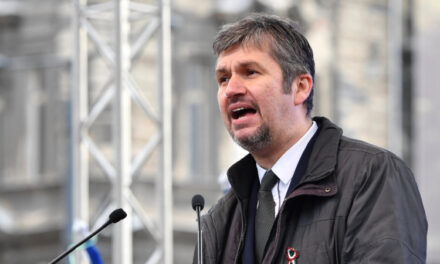If the leaders of Hungary and Israel have something in common – which other conservatives should follow if they want to produce something similar to the long-lived power of Orbán and Netanyahu – it is the attitude of serene doom with which they view even their most despicable opponents.
This is how the Spanish researcher remembers the background conversation held in Karmelita, which has since become famous, between Viktor Orbán and quite a few foreign journalists.
Among the participants of the meeting was Yair Netanyahu, the son of Orbán's Israeli colleague, who is himself an influential scientist, and a whole squad of his bodyguards was waiting outside.
- how is your father Orbán asked when he saw the young Netanyahu at one end of the table.
- He has, Yair replied, although lately the left has been up in arms against his new government. Orbán, who has recently become Israel's main EU ally and regularly vetoes resolutions defaming Israel in the EU Council, sympathized:
- Yes, I saw the aerial photos of Tel Aviv, he said, referring to the latest round of anti-government protests across Israel. Here was Yair's answer:
- Do you know who organized these demonstrations?
Laughter erupted throughout the hall at the poetic question. It is undoubtedly remarkable that those present - who came from Poland, Spain, France, Germany and other countries - knew without exception who was the target of Yair's insinuation. The fact that all of the columnists and reporters from the four corners of the world realized who the enemy Yair was referring to is truly indicative of the ongoing struggle between patriots and globalists around the world.
However, the lesson I learned from all this goes beyond György Soros.
It was a lesson in how to deal with left-wing hostility, no matter who happens to be behind it.
If there is something in common between the leaders of Hungary and Israel - which other conservatives should also follow if they want to produce something similar to the long-lived power of Orbán and Netanyahu - it is the attitude of serene doom with which they view even their most despicable opponents, not least the Hungarian-born philanthropist, who finances their opposition. Shrugging conservatism is about putting up with their pesky existence while not allowing them to change the path we've set in the least bit.
(…)
Orbán probably matured in the opposition until 2010, his previous half-heartedness about power was washed away by eight years of powerlessness. His main priority became to clean up the dirt of his predecessors: in the campaign that year, he proclaimed a one-word slogan: "Enough!". However, behind this was hidden a longer-term strategy, which he revealed at a similar meeting last summer.
In the wake of the Roman Empire, Uralic tribes settled in the plains watered by the Danube and bordered by the Carpathians, which formed the province of Pannonia, and soon adopted Christianity and set out on the course of the West. From then on, an obviously Western lifestyle took root and flourished in the territory of today's Hungary, for the future and survival of which Viktor Orbán is willing to risk even isolation.
This lifestyle puts family, God, and nation at the center of society, building relationships with other peoples while not submitting to anyone - regardless of how the opposition portrays it.
While other Western leaders strove to manage the coexistence with the masses of foreign cultures that appear as a result of Muslim immigration, which they believe is inevitable, as best as possible, Viktor Orbán declared the preservation of the way of life as his first priority at Thursday's meeting: We will avoid this coexistence, he said.
Orbán also knows that his vision will face strong opposition, but he is confident that its results in the form of widespread prosperity and socio-cultural security will strengthen the average voter and pave the way for Fidesz to become a central force, as was the case in a memorable 2009 he said in his speech.
His vision has culminated in the three elections he has won since 2010, but never as sky-shattering as in the most recent election in 2022.
All signs pointed to the end of Orbán's power that year. The entire anti-Orbán opposition - from the neo-Nazi Jobbik to the old-fashioned socialists and liberals - rallied behind Péter Márki-Zay, whom the Biden administration (later revealed to have given 4.5 million euros to his campaign) and the EU in a not-so-subtle way supported, which wanted to reduce Hungary's share of the COVID recovery fund citing dubious reasons for the rule of law. When he was asked at Thursday's meeting whether he would like Hungary to remain in the EU, Viktor Orbán jokingly remarked:
"No, but I have to!"
Viktor Orbán won an overwhelming victory. However, despite his two-thirds parliamentary majority, it is still not known whether his ideas will be fruitful in the long term. At a closed press event before the elections, Orbán admitted that he is not worried about 2022, but about 2026. Although, according to rumors, he is preparing several possible successors – from Foreign Minister Péter Szijjártó to Justice Minister Judit Varga – it is not clear whether Orbánism can survive Orbán.
Since winning the last election, the Prime Minister's reputational problem has shifted from the administration of justice and the protection of minors against LGBT content to the war in Ukraine, which Viktor Orbán wants to stop at all costs through a negotiated ceasefire, for which the opposition labeled him a pro-Putin "stroman". At Thursday's meeting, Viktor Orbán criticized the West for wanting to turn Ukraine into an "Afghanistan-like no-man's land" run by an anti-Russian puppet government.
When his comment was leaked, Zelenskyi and his supporters expressed extreme outrage, but Orbán did not retract what he said.
There are parallels between Viktor Orbán's state leadership and Israel's trajectory under Benjamin Netanyahu, and it is no coincidence that both are among the longest-serving leaders in the West. (…) There is little doubt that without the steely determination to see their program through despite the endless number of damning criticisms, a generation later there will be no conservatives in leading positions. When faced with conservatives who buckle under pressure or progressives who are honest about their goals from the start, it's hard to see what makes the former option attractive. Conservatives should learn to take the dislike with a smile and a shrug.
Featured image: MTI/Szilárd Koszticsák













